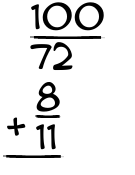What is 100/72 + 8/11?

|
This is how you add
|
|||||||||||||||||||||||||
Step 1Can you add yet? Nope! The denominators don't match. We need a common denominator. So next we take both denominators and multiply them. Next, take each numerator and multiply it by the denominator of the other term. So, we multiply 100 by 11, and get 1100, then we multiply 72 by 11 and get 792. Now for the second term. You multiply 8 by 72, and get 576, then multiply 72 by 11 and get 792. We now have a new problem, that looks like this:
|
|||||||||||||||||||||||||
Step 2Since our denominators match, we can add the numerators. 1100 + 576 = 1676 That gives us the sum, which is
|
|||||||||||||||||||||||||
Step 3Now, do we need to simplify this fraction? First, we attempt to divide it by 2... Are both the numerator and the denominator evenly divisible by 2? Yes! So we reduce it:
So far so good... let's try to divide by that number again. Are both the numerator and the denominator evenly divisible by 2? Yes! So we reduce it:
So far so good... let's try to divide by that number again. No good. So next you try the next prime number, which is 3... No good. So next you try the next prime number, which is 5... No good. So next you try the next prime number, which is 7... No good. So next you try the next prime number, which is 11... No good. So next you try the next prime number, which is 13... No good. So next you try the next prime number, which is 17... No good. So next you try the next prime number, which is 19... No good. So next you try the next prime number, which is 23... No good. So next you try the next prime number, which is 29... No good. So next you try the next prime number, which is 31... No good. So next you try the next prime number, which is 37... No good. So next you try the next prime number, which is 41... No good. So next you try the next prime number, which is 43... No good. So next you try the next prime number, which is 47... No good. So next you try the next prime number, which is 53... No good. So next you try the next prime number, which is 59... No good. So next you try the next prime number, which is 61... No good. So next you try the next prime number, which is 67... No good. So next you try the next prime number, which is 71... No good. So next you try the next prime number, which is 73... No good. So next you try the next prime number, which is 79... No good. So next you try the next prime number, which is 83... No good. So next you try the next prime number, which is 89... No good. So next you try the next prime number, which is 97... No good. So next you try the next prime number, which is 101... No good. So next you try the next prime number, which is 103... No good. So next you try the next prime number, which is 107... No good. So next you try the next prime number, which is 109... No good. So next you try the next prime number, which is 113... No good. So next you try the next prime number, which is 127... No good. So next you try the next prime number, which is 131... No good. So next you try the next prime number, which is 137... No good. So next you try the next prime number, which is 139... No good. So next you try the next prime number, which is 149... No good. So next you try the next prime number, which is 151... No good. So next you try the next prime number, which is 157... No good. So next you try the next prime number, which is 163... No good. So next you try the next prime number, which is 167... No good. So next you try the next prime number, which is 173... No good. So next you try the next prime number, which is 179... No good. So next you try the next prime number, which is 181... No good. So next you try the next prime number, which is 191... No good. So next you try the next prime number, which is 193... No good. So next you try the next prime number, which is 197... No good. So next you try the next prime number, which is 199... No good. 199 is larger than 198. So we're done reducing. And we're done! Here's the final answer to 100/72 + 8/11
|